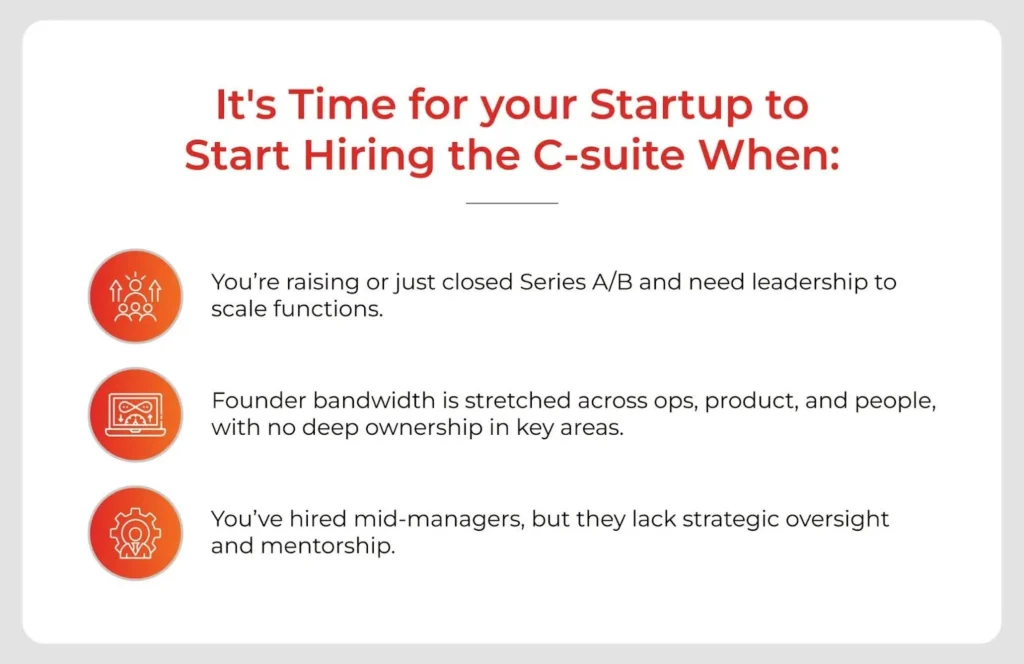Executive search for startups is a specialized, research-driven, and confidentiality-prioritized hiring model focused on finding and placing senior leaders. While C-suite hiring mistakes hurt any business, startups have the least room for error; a leadership mis-hire can derail momentum, stall funding, or have a deep negative impact on culture.
As startups, you operate in high-stakes, fast-changing environments where every executive role is critical. Hiring a VP of Product or a CFO isn’t just about filling a role—it’s about vision, ownership, and the ability to scale operations from chaos to structure.
But let’s face it: startups are scrappy. You lean on networks, investors, maybe even social platforms to find your executive talent. But the best executive leaders—the true crème de la crème—aren’t just pedigreed; they’re battle-tested. They’ve built systems from scratch, led through downturns, and know how to scale globally. These aren’t the folks scrolling job boards. Your immediate networks may not be enough to reach them.
That’s where executive search finds its footing.
Executive search goes beyond job postings to map markets, engage passive talent, and assess for long-term fit, while maintaining strict confidentiality. More importantly, it brings structure and strategic rigor to your leadership hiring.
In this guide, we’ll explore how executive search helps you build a resilient startup leadership team and why that’s often the difference between momentum and mis-hire.
What Is Executive Search and Why It Matters for Startups
Executive search for startups is how you build a leadership core that can scale your vision. Unlike traditional or contingency recruiting, it’s proactive, research-driven, and relationship-led. Instead of waiting for applicants, search firms keep an eye on the market, identify passive talent, and engage leaders who are the right fit, not just available.
For startups, this approach solves a very real problem: access to C-suite candidates. And hiring based on instinct or referrals alone can backfire. Executive search for startups aligns long-term business goals with leadership capability, helping you avoid costly mis-hires, accelerate decision-making, and build a C-suite that scales with your company.
Read more in our ultimate guide about executive search.
Why Founders Shouldn’t DIY the C-Suite
Startups need transformational leaders who can scale ideas, build teams, and pivot when needed.
Early founders are often used to solving problems on their own, leaning on their networks, and moving fast. But when it comes to hiring C-suite talent, gut instincts and warm intros aren’t enough.
Here’s why:
- Bias creeps in. Founders often hire people who feel familiar rather than those who push the business forward.
- The stakes are high. A VP of Engineering who can scale infrastructure is not the same as the one who helped you build an MVP.
- Time is limited. Screening, vetting, and closing senior candidates require a level of attention that most founders don’t have the bandwidth for.
In short: Hiring your C-suite is a strategic decision that demands a structured leadership hiring strategy.
How Executive Search Helps Startups Scale Their Leadership
Startups evolve fast. Your leadership needs today won’t look the same in 12 months. That’s why executive search firms help you anticipate and prepare for them.
Here’s how a well-run executive search for startups supports scalable growth:
1. Role Clarity
Search partners work with you to clearly define the scope, outcomes, and success metrics of each role. This prevents title inflation and ensures hires aren’t set up to fail.
2. Access to Passive Talent
Top executives aren’t looking; they’re being found. Search firms use discreet outreach and sector intelligence to engage proven leaders who aren’t on the market.
3. Speed + Precision
Contrary to the assumption that executive search is slow, the process is structured to reduce time-to-hire by removing unqualified noise. While timelines can vary, executive search for startups usually takes 6–12 weeks, depending on the role’s complexity and location.
4. Alignment Over Aptitude
The best search partners assess for cultural and strategic fit in addition to credentials. That’s especially critical for startups where every hire impacts momentum.
5. Reduced Risk of Mis-Hires
According to Harvard Business Review, the cost of a failed executive hire can be up to 10x the base salary. Structured search significantly reduces that risk by focusing on long-term performance predictors.
6. Confidentiality
Executive search protects sensitive leadership transitions. Whether you’re replacing an underperformer, opening a new market, or signaling a strategic shift, discretion matters. Search firms operate under strict confidentiality protocols, ensuring your plans stay private until you’re ready to go public — shielding both internal morale and external perception.
When Should Startups Start Hiring the C-Suite?

There’s no perfect playbook, but certain signals tell you it’s time.
- You’re raising or just closed Series A/B and need leadership to scale functions.
- Founder bandwidth is stretched across ops, product, and people, with no deep ownership in key areas.
- You’ve hired mid-managers, but they lack strategic oversight and mentorship.
In such cases, it’s no longer a matter of whether to hire but about who, when, and how.
Early misalignment is fixable. Late-stage leadership missteps are much harder to unwind.
How Do Executive Search Firms Find Candidates?
This question often comes from founders who are skeptical: “What’s the magic?” The answer: there isn’t one. But there is a process that is disciplined, data-backed, and relationship-driven.
Here’s what most retained executive search firms do:
- Conduct market mapping to identify high performers in relevant sectors
- Engage candidates through warm, personalized outreach not mass InMails
- Vet using structured interviews and validated frameworks like Leadership Potential Models
- Present a curated shortlist with strengths, risks, and fit insights
It’s less headhunting, more matchmaking with strategic outcomes in mind.
Common C-Suite Roles for Startups (and When to Hire Them)
Every startup is different, but certain C-level roles appear earlier depending on your growth stage:
| Role | When to Hire | Why It Matters |
|---|---|---|
| Chief Technology Officer (CTO) | Post-MVP, pre-scale | Sets architecture, builds team |
| Chief Marketing Officer (CMO) | Post-product-market fit | Grows demand, drives GTM |
| Chief Financial Officer (CFO) | Pre-Series B | Manages burn, guides investor reporting |
| Builds culture, systems, and retention | 40+ headcount | Builds culture, systems, retention |
The right startup leadership team isn’t built all at once, but in response to needs and signals. Executive search helps you do it in sync with growth, not ahead or behind it.
How to Choose the Right Executive Search Partner
Not all firms are equal. Some specialize in industry verticals, others in early-stage scaling. Here’s what to look for:
- Experience with startups, not just enterprises
- Transparent process and timelines
- A track record of repeat placements, indicating trust and results
- Candidate care: how they treat people reflects how they’ll represent your brand
Once you’ve chosen a partner, the next step is to align on process and expectations, something SHRM covers in detail with best practices for working effectively with executive search firms.
The Bottom Line: Scaling with Intent Starts at the Top
Startups live or die by the quality of their leadership team. Great products can’t fix poor executive decision-making. Culture doesn’t scale on its own. And operational chaos isn’t a badge of startup hustle. It’s a symptom of leadership gaps.
Executive search gives startups an edge in hiring smart. It helps align your vision with leadership execution, your funding with operational maturity, and your momentum with stability.
And here’s the overlooked truth: building a leadership team isn’t just about today’s goals. It’s about making your company resilient for what’s coming. Think new markets, exits, downturns, or reinvention.
A structured C-level recruiting strategy ensures you’re building with foresight.
At SPECTRAFORCE, we understand the nuances of startup hiring. Whether you’re navigating your first executive hire or building out a full startup leadership team, our approach combines market intelligence, industry networks, and cultural insight to deliver high-impact leaders.
We help you:
- Define role clarity and success metrics
- Identify and engage aligned candidates
- Streamline the executive hiring process
- Build a C-suite that scales with you
Explore our Executive Search Services.
FAQs
The essential C-suite roles for early-stage startups typically include the Chief Technology Officer (CTO), Chief Financial Officer (CFO), and Chief Marketing Officer (CMO). These roles form the operational backbone, driving product development, financial stewardship, and go-to-market execution. Depending on your stage and sector, you may prioritize one over the other, but these three are foundational when moving from MVP to scale.
Executive search firms help scale your startup’s leadership team effectively by going beyond resumes. They align each leadership hire to your specific growth stage, company culture, and long-term goals. By identifying high-caliber, passive candidates and vetting them for both skills and strategic fit, executive search firms reduce the risk of mis-hires and accelerate sustainable growth.
The most effective strategies to ensure a successful and sustainable C-suite build in startups include defining clear outcomes for each role, hiring based on readiness rather than title alone, and ensuring strong cultural alignment. Layering in experienced executive search partners brings market insight and hiring discipline that help you make leadership decisions with confidence, not guesswork.
The right time for startups to hire senior executive roles during growth is when operational complexity starts to outpace founder bandwidth. If you’re entering a funding round, scaling your team, or struggling to maintain strategic direction, it’s usually time. Delaying C-level recruiting at this point risks misalignment, stalled execution, or missed investor expectations.
To retain top C-suite talent for long-term success, a startup must offer more than compensation. Retention is driven by clarity of vision, alignment on values, strategic involvement in decision-making, and a meaningful stake in the company’s outcomes. The most successful founders treat leadership hires as partners in the journey.



